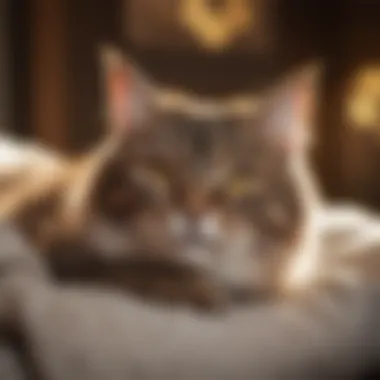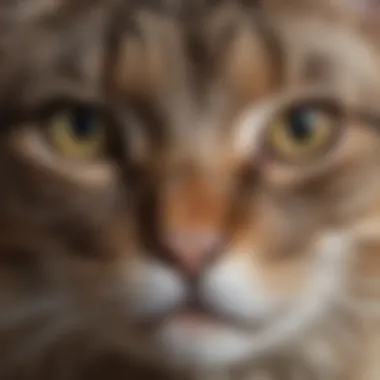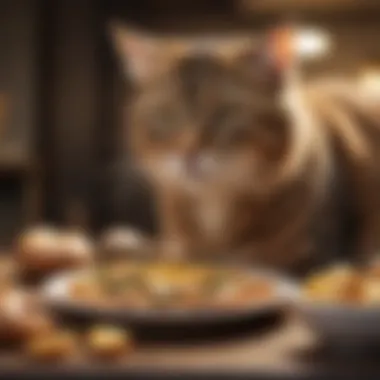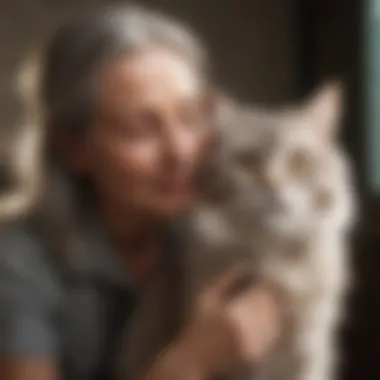Essential Tips for Caring for Senior Cats


Intro
As cats age, their needs change dramatically. Understanding these distinct requirements is crucial for providing adequate care during their later years. This part of the article will examine the essentials of pet care that every cat owner should embrace when caring for a senior cat.
Pet Care Essentials
Caring for senior cats transcends just fulfilling basic needs. It requires an observant approach to their daily lives, especially around nutrition, playtime, grooming, and health monitoring. Here's how to start ensuring a good quality of life for your aging feline friend.
Daily Nutrition Requirements
Feeding senior cats requires careful consideration. Their metabolism may slow down, leading to health issues like obesity. It is essential to choose high-quality cat food formulated for seniors. Such food should contain adequate protein and nutrients to support health without excessive calories.
Plan small, more frequent meals to prevent digestive problems. Always provide fresh water and monitor your cat's eating habits. It is also advisable to consult with a vet for tailored advice based on the cat’s health status.
Exercise and Playtime
Exercise remains vital for senior cats. Despite needing less physical activity than younger cats, they should still engage in gentle play. Slow and interactive playing can help maintain their muscle tone and mental agility. Use toys that are easy to manage and encouraging. Long engaging sessions are not necessary; short bursts of play can stimulate them mentally and physically.
Grooming Tips
Grooming becomes increasingly important as cats age. Many senior cats cannot groom themselves as effectively. As a result, regular brushing will help reduce matting and hairballs. Pay attention to the cat's sensitive areas. Check and clean their ears and maintain nail care regularly. Establishing a routine can help both the cat and owner stay comfortable during grooming sessions.
Health and Wellness Check-ins
Regular health assessments are central to effective senior cat care. Schedule vet visits at least twice a year. During these visits, discuss concerns regarding your cat's appetite, weight, and behavior. A comprehensive checkup is needed to ensure nothing goes unnoticed.
While managing their care can sometimes feel overwhelming, adaptability and regular monitoring can facilitate a fulfilling and happy life for senior cats.
Understanding Senior Cats
Caring for senior cats has become an important focus among pet owners and veterinarians alike. Understandin senior cats ensures that these beloved felines receive the proper care, which is essential to ensuring their well-being and comfort. Seniority affects a cat’s physical and emotional health, making it critical to be aware of the nuances involved in their care.
The right knowledge can significantly enhance the quality of life of senior cats, offering them a comfortable and fulfilling living environment.
Defining Senior Cats
The age at which a cat is considered senior can vary, but the transition typically occurs around the age of 7 years. At this point, a cat might begin to show signs that they are aging. It is important to note, however, that senior cats do not all experience aging in the same way.
A general estimate indicates that the equivalent human age scales might place a 7-year-old cat around the age of 44 in human terms. Understanding this concept of aging helps pet owners to perceive the changes their cats undergo in both physical and behavioral aspects.
Physical Changes in Aging Cats
As cats age, several physiological changes might occur. Their metabolism can slow down, which often leads to weight changes, either gain or loss. The aging process affects the cardiovascular system, causing it to be less efficient. Moreover, there may be increased susceptibility to diseases, such as diabetes and kidney problems.
Common physical changes include:
- Dental Issues: Many senior cats suffer from dental disease which can affectnutrition.
- Mobility Challenges: Arthritis might make it difficult for cats to jump or move about as quickly as they used to.
- Altered Fur Quality: Coat quality can decline as cats age, resulting in loss of volume or shine.
Recognizing these physical changes enables cat owners to take proactive measures, such as enhancing diet and environmental conditions, which can contribute to a more comfortable life for their senior felines.
Behavioral Changes in Senior Cats
Seniority also comes with changes in behavior. Some elder cats may become more sensitive to their surroundings or choose to avoid active play. Often, they can be less independent, displaying a greater need for reassurance and company.
Notably:


- Increased Sleep Time: Older cats tend to snooze a lot more than younger cats. Short naps will become more frequent.
- Change in Social Interaction: They may seek more human attention. Alternatively, some senior cats distance themselves from discomfort or stress.
- Urinary Issues: Changes in litter box behavior might also manifest, requiring diligent observation.
Again, identifying and understanding these behavioral shifts allow for improved strategies in care that can drastically affect both the emotional and psychological needs of aging cats.
Health Assessment for Senior Cats
Understanding the importance of health assessments for senior cats is crucial for ensuring they live their lives comfortably and healthily. Senior cats, typically defined as those 7 years old and up, experience a variety of physical and emotional changes. These changes can impact their overall well-being. Regular health assessments help identify potential issues early, allowing for timely intervention.
Regular veterinary visits should be scheduled at least once a year. These check-ups help monitor vital signs, weight, and general health conditions, which can often shift rapidly in older cats. Moreover, they also provide a perfect opportunity for pet owners to discuss any concerns regarding their cat's behavior or diet.
Regular Health Check-ups
Regular health check-ups serve as a vital component in maintaining your senior cat's health. During these visits, a veterinarian performs a thorough examination that may include:
- Checking the heart and lung functions.
- Measuring body condition and weight.
- Evaluating dental health.
- Conducting blood tests to monitor organ functions.
- Looking for signs of dehydration or other issues.
The results from these examinations provide insights that allow for adjustments in diet and exercise. Establishing a relationship with a veterinarian who understands geriatric care also aids in creating a long-term health management plan tailored to your cat’s needs.
Common Health Issues
Senior cats are susceptible to several common health issues. Awareness of these conditions can prompt early diagnosis and treatment.
The most common health problems include:
- Osteoarthritis
- Kidney disease
- Hyperthyroidism
- Diabetes mellitus
- Dental issues
Each of these conditions can result in significant discomfort and affect the cat's quality of life. Prevention through routine care, along with observation for symptoms, is essential. Since the physical changes often manifest subtly, proactive responses are crucial.
Signs of Illness in Senior Cats
Observing your senior cat for any signs of illness is imperative. Sometimes, subtle behavioral changes can be the first indicators that something is amiss. Owners should look for:
- Changes in eating or drinking habits
- Weight fluctuations
- Unexplained lethargy or increased hiding
- Altered litter box usage
- Excessive grooming or neglecting grooming
Recognizing these symptoms early can lead to important interventions. Even minor changes sometimes signal underlying issues that warrant veterinary attention. Understanding your cat’s normals can ensure any changes are addressed promptly.
In essence, regular examinations and close observations are key to your senior cat's health and longevity.
Dietary Considerations
Caring for senior cats extends beyond basic health monitoring; dietary considerations play a crucial role in maintaining a cat's overall vitality and well-being. As cats age, their nutritional needs evolve, making it essential to adjust their diets to support their changing physiology. Proper nutrition can alleviate common health issues related to aging and enhance the quality of life for senior cats.
Nutritional Needs of Senior Cats
Understanding the specific nutritional needs of senior cats is vital for their well-being. Senior cats often require less protein than younger cats due to a decrease in muscle mass and activity levels. However, this does not mean they should receive inadequate protein; high-quality protein remains important for every senior cat’s health. Essential amino acids like taurine must still be included in their diet. Cats may also need diets lower in calorie count to manage weight effectively while maintaining lean muscle.
Fat is another consideration; senior cats can benefit from a slight increase in fat content. Fat serves as an energy source and aids in the absorption of fat-soluble vitamins. Additionally, senior cats require increased food quality with antioxidants to combat oxidative stress that can arise as they age.
Choosing the Right Food
With numerous cat food options available in the market, it can be overwhelming to choose the right one for senior cats. Several factors and product labels deserve consideration:
- Dry vs. wet food: Wet food is generally more palatable and helps promote hydration, which is crucial for kidney health. Meanwhile, dry food can offer dental benefits. Balancing both may be beneficial.
- Diet formulation: Select a product specifically formulated for senior cats. Such formulas often contain appropriate levels of proteins, fats, and added vitamins and minerals to support aging felines.
- Special needs: Some senior cats may have specific healthcare requirements. For instance, foods designed for cats with kidney disease should be lower in phosphorus and protein. Likewise, diets that cater to diabetes are essential for those who might be glucose intolerant.
Brands like Hill's Science Diet, Royal Canin, and Purina Pro Plan provide tailored diets that address the unique requirements of senior cats. Always consult with a veterinarian before transitioning to a new food brand as this can have significant impacts on a cat’s health.
Hydration and Senior Cats


Hydration is often an overlooked aspect in feline care, particularly for senior kittens. Cats are known for their low thirst drive, which increases the risk of dehydration—especially in cats with certain health conditions. To ensure adequate water intake, consider these suggestions:
- Wet food incorporation: As noted earlier, wet food contains about 70-80% moisture, contributing to overall hydration. Make this a staple in their diet.
- Fresh water availability: Always provide access to clean and fresh water. Water bowls should be refilled regularly, and consider experimenting with water fountains, which might attract more interest from your cat.
- Flavor enhancers: Occasionally, adding a splash of low-sodium chicken broth or tuna water can entice senior cats to drink more. Individual preferences may vary, so observe what your cat fancies.
Proper hydration is an essential aspect of maintaining good kidney function and overall health in senior cats.
Environmental Modifications
Caring for senior cats necessitates adapting their environments. As cats age, they face unique challenges. From mobility issues to decreased sensory perception, creating suitable modifications can greatly enhance a cat's quality of life. With proper adjustments, pet owners can foster a more secure and comfortable living space that allows their feline friends to maintain independence and safety while navigating their surroundings. Environmental alterations can also mitigate stressors, leading to greater emotional well-being and reduced anxiety.
Creating a Safe Space
A safe space is integral for any elderly cat. Older cats often require specific environments where they can retreat without disturbance. This area should be quiet and away from high-traffic zones. Safe spaces often feature familiar items, such as favorite blankets or toys. Additionally, it’s vital that the space is easily accessible, especially for cats that are experiencing mobility challenges. This space becomes their haven. Ensuring litter boxes, food, and water bowls are within a short walking distance retains independence.
Mobility Features for Senior Cats
Mobility is a significant concern as cats age. Owners should consider adjustments like ramps or low-sided beds. These enhancements assist cats in comfortably accessing their spaces. Non-slip mats can also provide stability on slippery floors. Moreover, thick carpets help cushion falls. Also, owner should calmly observe their cat’s movements. If you notice hesitance in jumping or climbing, greater mobility features can encourage confidence. Keep in mind that outright assistance may be necessary in these cases to prevent injury.
Comfort and Nesting Options
Comfort becomes crucial for senior pets. Bedding should be appropriately designated in multiple areas of the home allowing for easy access. Orthopedic beds can alleviate physical discomfort during resting periods. In addition to providing physical comfort, creating cozy nesting areas satisfies the need for security. Cats tend to enjoy enclosed spaces. Boxes or cat beds placed in warmer spots support their body's thermal comfort. Ultimately, this aids in maintaining both physical and emotional well-being.
Consider your cat’s distinct preferences when modifying their space. Familiarity is key in reducing stress.
Mental and Emotional Well-being
Caring for senior cats involves looking beyond their physical needs. The emotional and mental well-being of these animals is crucial for their quality of life. As cats age, they may experience increased anxiety, altered behaviors, and emotional changes. Understanding and attending to these needs can significantly enhance their overall health. When senior cats feel secure and engaged, they are likely to exhibit fewer behavior problems and maintain better physical health. This section explores key aspects regarding the mental and emotional health of senior cats.
Understanding Emotional Changes
As cats grow older, they may face various emotional transitions. Cognitive decline can occur, which impacts how they relate to their environment. Your senior cat may seem more withdrawn or hesitant than before. Some common emotional changes include:
- Increased anxiety around unfamiliar situations
- A tendency to hide or avoid social interaction
- Decreased interest in activities they once enjoyed
Recognizing these signs is the first step in providing adequate support. Create a calm and safe environment, ensuring familiar smells and routines to help minimize stress. Engaging your cat's mind through consistent interaction can also counteract emotional turmoil. A dedicated approach to acknowledging and addressing these various signs can create a more comforting and supportive atmosphere for your feline friend.
Engagement Activities for Senior Cats
Keeping senior cats mentally stimulated is essential. Engagement can take multiple forms and should be tailored to their individual abilities and interests. Consider the following activities:
- Interactive Toys: Choose toys that encourage problem-solving. Puzzle feeders can stimulate their minds while rewarding them with treats.
- Gentle Play: Engage in soft play sessions. Use feathers or string toys, but be cautious. Some older cats are less mobile.
- Exploring New Textures: Providing different materials can intrigue your cat physically and mentally—try scratching posts or mats with unique designs.
- Sensory Experiences: Use items like catnip or treats to stimulate smell, fostering alertness.
Engagement activities promote not only mental stimulation but also companionship and bonding. Reducing boredom through these activities can alleviate strains on mental health.
Dealing with Separation Anxiety
Separation anxiety is a common issue faced by senior cats. This includes distress when owners leave, which could cause unhappiness or unhealthy behavior changes. Symptoms often displayed include:
- Excessive vocalization
- Destructive behavior or inappropriate elimination
- Changes in eating habits
To manage this worry, consider these strategies:
- Gradual Desensitization: Practice leaving and returning in short intervals. Gradually increase the time away to help your cat adjust.
- Comforting Items: Provide items like a favorite blanket or toys infused with calming scents. This lowers feelings of isolation when you are not present.
- Create Interesting Spaces: Prepare cozy spots where your cat can observe their surroundings. Setting high perches or quiet corners may comfort them during your absence.
Proper understanding and attention to your cat’s emotional needs are critical in enhancing their quality of life, especially in their later years.


End-of-life Considerations
Caring for a senior cat often leads to confronting the end-of-life stage. This section involves delicate considerations for both the cat and the owner. It is crucial to prioritize the quality of life during this stage. Decision-making also becomes more significant and emotionally complex. Being informed allows owners to navigate this period with both grace and compassion.
Recognizing Quality of Life
Identifying the quality of life for an aging cat requires careful observation. Some significant indicators include:
- Appetite changes: Is your cat eating less or showing disinterest in their favorite food?
- Mobility: Notice any difficulties in movement, like struggling to jump onto favorite surfaces.
- Interaction: Monitor changes in interest in playing or socializing. A once interactive cat may withdraw into isolation.
Veterinarians often recommend using specific quality of life scales, such as the HHHHHMM scale. This allows pet owners to objectively evaluate their feline's state in terms of happiness, hurt, and more. Remember that behavioral shifts, especially in older cats, usually operate as essential signals about their wellness.
Palliative Care for Senior Cats
Palliative care prioritizes comfort over treatment. This approach aims to alleviate pain and improve the overall quality of life for your senior cat. It's essential to adopt measures that provide relief without invasive procedures. Here are some suggestions:
- Effective pain management: Regular consultations with a veterinarian can help implement medications or therapies to relieve discomfort.
- Comfortable resting spaces: Bed surfaces should be soft. Consider using orthopedic heating pads.
- Nutrition adjustment: Sometimes, a specialized diet can combat nausea and improve overall health.
Adding routine elements like gentle hydrations and daily companion interactions can further comfort your senior companion. Providing a relaxed atmosphere supports mental well-being which plays a pivotal role during this phase.
Making End-of-life Decisions
End-of-life decisions are often the most challenging for pet owners. Several considerations are critical:
- Personal Values: Reflect on what you value for your cat's lifestyle. Think about any conditions that feel unacceptable to you.
- Professional Guidance: Consulting with a veterinarian specialized in geriatrics becomes vital. They can offer information on potential treatment options versus the natural decline.
- Discussing Euthanasia: This option often emerges. Facing this choice demands significant emotional strength, and creating a tranquil path to say goodbye ensures a smoother transition.
Resources and Support
Helping senior cats navigate their later years goes beyond just providing food and shelter. Establishing a network of resources and support is essential for cat owners. This ensures that they can cater to the various needs of an aging feline. From veterinary care to community groups, having access to information and resources greatly enhances the quality of life for senior cats. Support networks not only offer guidance but also foster emotional resilience for pet owners as they face changes that come with a cat aging.
Finding a Veterinarian Specialized in Geriatrics
When caring for a senior cat, finding a veterinarian with experience in geriatric care is important. Specialized veterinarians understand the unique medical challenges that come with aging. A regular vet might not have the specific skills needed to address these issues. Look for vets who emphasize preventive care, pain management, and nutritional needs of older cats. Inquire about their experience with conditions common in senior felines, such as diabetes, kidney disease, and arthritis.
To find quality care, consider:
- Asking for recommendations from other pet owners
- Checking online reviews of local veterinarians
- Looking into animal clinics that offer geriatric wellness programs
Having a trusted veterinarian can make a significant difference in monitoring and maintaining a senior cat’s health. Regular visits can assist in early detection of potential issues.
Support Groups for Cat Owners
Connecting with others facing similar experiences can be an invaluable resource. Support groups for cat owners provide an avenue of sharing information, coping strategies, and emotional support. These communities usually exist online or through local assemblies. Talking to others about challenges specific to aged cats can create a sense of understanding and belonging.
Some benefits of joining support groups include:
- Access to shared wisdom and experiences
- Learning from discussions on health, diet, and behavior
- Emotional encouragement through shared struggles
- Networking opportunities with both veterinarians and other pet care professionals
Online Platforms
Cats owners can explore platforms like Facebook or Reddit to find specific groups catered to senior cats, creating even more access to knowledge and support.
Online Resources for Further Reading
Researching online is also crucial for staying informed about developments in cat care. Numerous reputable resources exist where owners can gain insights specific to geriatric feline care. Websites offered by veterinary associations often publish articles addressing common concerns.
Some useful resources include:
- Wikipedia - for an overview of cat health
- Britannica - providing general knowledge relevant to pets
- Animal health forums on Reddit - where peers share real-life advice
These online platforms and databases also provide updates on advancements in veterinary techniques and care approaches for senior cats. Both local and online resources can empower owners to provide better care for their aging companions.
By utilizing these resources, cat owners can ensure aged felines receive the specialized attention and care they deserve.







